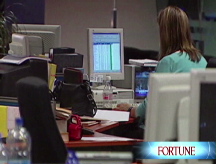The Fed's dollar defense
Bernanke pledges to fight inflation, but a grinding slowdown and financial sector unrest could tie his hands.
NEW YORK (Fortune) -- Ben Bernanke better hope the market doesn't call his bluff.
The Federal Reserve chief this week took the unusual step of saying the Fed is ready to defend the dollar. "We are attentive to the implications of changes in the value of the dollar for inflation and inflation expectations," Bernanke said Tuesday at the International Monetary Conference in Barcelona, "and will continue to formulate policy to guard against risks to both parts of our dual mandate, including the risk of an erosion in longer-term inflation expectations."
Until this week, Bernanke had been content to let Treasury Secretary Henry Paulson take the lead on questions about the dollar's decline. Lately, though, inflation has replaced the subprime meltdown and the possibility of recession as the hot-button economic issue. Bernanke's remarks in Spain signal that the central bank aims to keep the dollar - which has lost a quarter of its value against other major currencies over six years - from sliding anew and further eroding consumers' purchasing power.
The dollar's rally in the wake of Bernanke's comments show the markets believe the Fed can defend the greenback, most likely by raising interest rates. But with the U.S. economy slowing and the financial markets showing renewed signs of unrest, will the Fed actually follow through? That's another question altogether.
"Any move the Fed takes to strengthen the dollar and cut inflation, such as significantly raising interest rates and slowing the growth of the money supply, will lead to a necessary, but unpopular, economic contraction," says longtime dollar bear Peter Schiff of broker-dealer Euro Pacific Capital in Darien, Conn. "As clearly shown in his brief tenure in office, Ben Bernanke has no stomach for such tough love."
Indeed, the Fed has spent the past nine months cutting interest rates and lending freely to financial firms in a bid to prevent the financial system from seizing up. Those unusual actions have succeeded in staving off a calamity, but the economy remains weak and appears to be getting weaker: Unemployment is rising, and home prices are falling at a record clip.
So for now, the Fed simply wants to keep rates steady. Putting rates on hold is "an important step," says Ashraf Laidi, currency analyst at CMC Markets in New York. Doing so could maintain stability in the dollar and help arrest the rise in food and energy prices that have punished U.S. consumers already pressured by slow wage growth, falling house prices and stagnant job creation. Laidi says the Fed is apt to focus on managing rates because central bank currency interventions - coordinated purchases of dollars, for instance, aimed at shoring up prices and punishing speculators - are often "counterproductive."
Nonetheless, Laidi believes the Bernanke may find himself cutting rates again in the fourth quarter of this year because the economy is still early in the job-loss cycle. Heading into Friday's jobs report, the U.S. lost jobs for four straight months, he says. In each of the past two recessions, in 1990 and 2001, payrolls contracted for at least 11 straight months, he notes. So labor market weakness is likely to run for at least another half a year before there's a recovery, according to Laidi.
Tough anti-inflation talk elsewhere in the world could also complicate the Fed's job. Jean-Claude Trichet, head of the European Central Bank, said Thursday the ECB hasn't ruled out raising interest rates next month. Many observers suspect the ECB is, like the Fed, trying to beat down inflation expectations by signaling that it is ready to take action - while hoping it doesn't need to do so. But the mere suggestion the ECB could soon raise rates sent the dollar lower against the euro again Thursday.
Laidi says he believes renewed "erosion" in the financial markets could force the Fed to resume its easing path as well. The sharp selloff in shares of investment bank Lehman Brothers (LEH, Fortune 500) in the first half of this week suggests investors remain uneasy about potential losses in the financial system. One way the Fed fights these concerns is by keeping short-term rates low, allowing banks to profit from the spread between the short-term rates they borrow at and the long-term rates they lend at.
If there's a bright spot for Bernanke, it's that not everyone is persuaded the U.S. is facing runaway inflation. "Everybody is judging the inflation landscape strictly on what is happening in the commodity markets," Merrill Lynch economist David Rosenberg wrote this week. "Yet when the [Commodity Research Bureau's commodity price index] was sagging at between 15% and 20% annual rates with near consistency in 1998 and 1999, and the headline inflation rate was locked in a 1.5% to 2.5% band, nobody questioned why it was back then that the CPI wasn't deflating along with the commodity complex."
Rosenberg writes that with productivity rising and unit labor costs flat, there's no sign yet of the damaging wage-price spiral of the 1970s. That's a good thing for Bernanke. But investors may yet come to other conclusions and resume selling their dollars - and if they do, there may not be much the Fed can do about it. ![]()
-
 The retail giant tops the Fortune 500 for the second year in a row. Who else made the list? More
The retail giant tops the Fortune 500 for the second year in a row. Who else made the list? More -
 This group of companies is all about social networking to connect with their customers. More
This group of companies is all about social networking to connect with their customers. More -
 The fight over the cholesterol medication is keeping a generic version from hitting the market. More
The fight over the cholesterol medication is keeping a generic version from hitting the market. More -
 Bin Laden may be dead, but the terrorist group he led doesn't need his money. More
Bin Laden may be dead, but the terrorist group he led doesn't need his money. More -
 U.S. real estate might be a mess, but in other parts of the world, home prices are jumping. More
U.S. real estate might be a mess, but in other parts of the world, home prices are jumping. More -
 Libya's output is a fraction of global production, but it's crucial to the nation's economy. More
Libya's output is a fraction of global production, but it's crucial to the nation's economy. More -
 Once rates start to rise, things could get ugly fast for our neighbors to the north. More
Once rates start to rise, things could get ugly fast for our neighbors to the north. More









